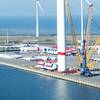The Port of Vancouver is the first in Canada to attempt to entice ships to burn cleaner fuels and lower greenhouse gas emissions.
However an environmental group says it will take government regulation to truly stop cargo ships from burning the molasses-like bunker fuel in Canada's ports.
The Vancouver program reduces harbour dues to ships burning cleaner fuel.
The program ranks emissions at gold, silver and bronze levels.
Darrell Desjardin, director of environmental programs with the Port of Vancouver, said the measure is a bridge to eventual international environmental shipping regulations.
"What better way to do it than offer a cash incentive to reduce emissions?"
Desjardin isn't sure what kind of impact the program will have in reducing emissions in the area, but adds several vessels that the port has assessed are already at the gold and silver level for cutting emissions.
"This is creating incentives now, rather than waiting for regulation."
He said two container lines have already committed to using lower sulphur fuels in the ports of Vancouver, Seattle and Tacoma, Wash.
"We've seen some unintended benefits. We've actually seen shipping lines competing against each other to get to a higher classification."
Most cargo ships burn bunker C fuel.
"It's the least refined product, it's cheap and It's very stable at sea," said Karen Wristen, executive director with the Society Promoting Environmental Conservation.
"It's the consistency of cold molasses, and there's very little risk of spillage."
Wristen called the port program progressive, but wondered how successful such a program can be without regulation behind it.
"It's going to mean some upgrading for the ships involved and I don't see them, unless the incentive is huge, I don't see them investing in the capital to upgrade the ships."
She noted a recent study that showed marine emissions are expected to outweigh emissions from vehicles in the Lower Mainland within the next decade.
Canadian laws are the only answer to curbing marine pollution, she said.
"It's only the cruise ships that are regulated under American law and have to burn cleaner fuel that are actually doing it."
The ports of Los Angeles and Long Beach launched an aggressive plan against maritime pollution last November with its Clean Air Action Plan.
Rachel Campbell, spokeswoman for the ports, said its a precedent-setting agreement.
"Most of the customers have been great in volunteering by adopting some of these programs, like vessel speed reduction, slowing down when they enter port waters, and definitely using the (cleaner) fuel."
The plan is to cut emissions by almost half from the ports over the next five years.
Gary LeRoux, executive director of the Association of Canadian Port Authorities, said while Vancouver's port is the first in this country to attempt to cut emissions, other Canadian ports are also considering similar action.
A program called Green Marine in the Great Lakes and St. Lawrence area was established a year ago.
Sponsored Content
Innovative Hull Maintenance: Profitable & Green

Subscribe for
Maritime Reporter E-News
Maritime Reporter E-News is the maritime industry's largest circulation and most authoritative ENews Service, delivered to your Email five times per week












